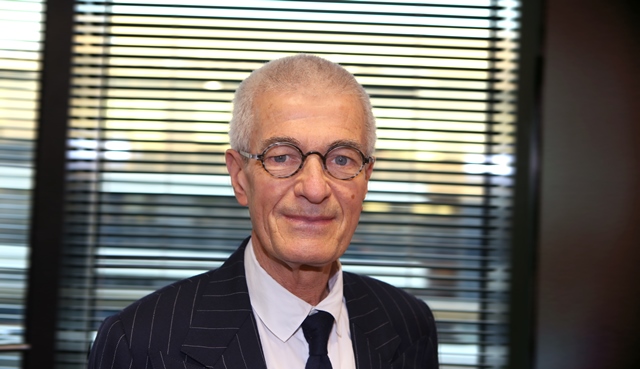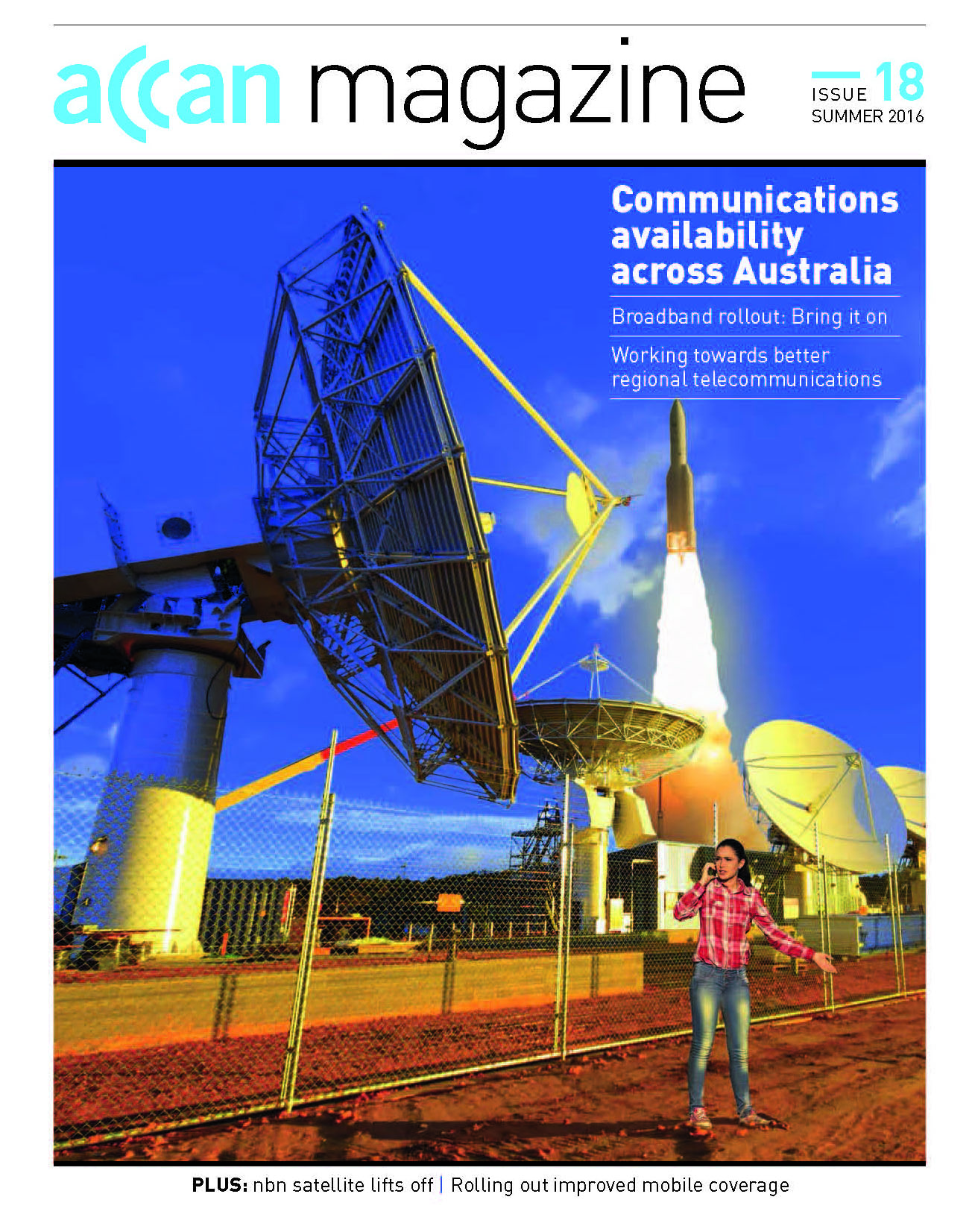Home
- Details
 Dr Paul Paterson is the Chief Economist of the Bureau of Communications Research (BCR), an independent economic and statistical research unit within the Department of Communications and the Arts. We interviewed Dr Paterson to get some insights into his work in the communications industry and the scope of the BCR.
Dr Paul Paterson is the Chief Economist of the Bureau of Communications Research (BCR), an independent economic and statistical research unit within the Department of Communications and the Arts. We interviewed Dr Paterson to get some insights into his work in the communications industry and the scope of the BCR.
Dr Paterson, you have worked as an economist in the communications sector for over 20 years, what would you say is the biggest development in that time?
Yes, a long time with huge changes. In this time I have worked as an economic consultant, a regulator and as a senior executive in both the public and private sectors, in Australia and overseas. During this time I've seen many impressive developments in the comms sector, including the:
Read more: BCR Chief Economist, Dr Paul Paterson
Write comment (0 Comments)- Details
In 2014 the Vertigan panel made 53 recommendations on regulatory and market structure matters. The proposed legislation addresses recommendations made in relation to improvements in the access regime and nbn's authorised conduct. ACCAN expressed concern over three parts of the legislation.
- Details
 A recent Disability Discrimination complaint lodged with the Australian Human Rights Commission against the former Communications Minister, now Prime Minister, Malcolm Turnbull was resolved last month with the Office of the Prime Minister committing to ensure all its future videos will now be accurately captioned prior to posting to the web.
A recent Disability Discrimination complaint lodged with the Australian Human Rights Commission against the former Communications Minister, now Prime Minister, Malcolm Turnbull was resolved last month with the Office of the Prime Minister committing to ensure all its future videos will now be accurately captioned prior to posting to the web.
The conciliated outcome with the Prime Minister's Office ensures that people who rely on captions will now have the same real-time access to information as the rest of the community.
Read more: Great outcome for consumers who rely on captions
Write comment (0 Comments)- Details
ACCAN has made a submission to the International Telecommunications Union (ITU) 2016 stakeholder consultation on "Access to the Internet for persons with disabilities and specific needs". Drawing from the ongoing work and research we undertake to promote full participation of people with disability in our increasingly connected society, we have made a number of specific recommendations on how access to the internet can be increased for people with disability.
Read more: Access to the internet for persons with disabilities and specific needs
- Details
 We have reached a point in modern society where we seem to go online for everything. To organise meals, book transport, pay bills, earn an income, vote, communicate and of course, obtain all sorts of goods and entertainment.
We have reached a point in modern society where we seem to go online for everything. To organise meals, book transport, pay bills, earn an income, vote, communicate and of course, obtain all sorts of goods and entertainment.
Yet, there are still some people who can't or won't go online. For some, a proxy internet user takes their place: someone who goes online on behalf of others. Usually an informal relationship, proxy users are an overlooked group of consumers. It is easy to assume that proxy users undertake practical internet activities, such as shopping or checking timetables, on behalf of others, but it could be that they undertake a much wider variety of activities altogether.
Read more: Going online on behalf of others
Write comment (0 Comments)- Details
The Productivity Commission is looking at Australia's intellectual property system to make sure there are the right incentives for innovation, investment and the production of creative works. The aim is that these protections for intellectual property owners' don't unreasonably stop consumers benefiting from innovation, competition, investment and access to goods and services.
Read more: Productivity Commission Inquiry into Australia's Intellectual Property Arrangements
- Details
[Watch on Youtube - Video will autoplay -
please note this video does not contain sound as it has
been produced for the Australian Deaf community]
Imagine watching an emergency broadcast when you are unable to understand what is being said. If you can't understand what is happening, then you will not have access to important, possibly life saving information.
This is a situation that Deaf Australians who are Auslan users may experience when watching emergency broadcasts when an Auslan interpreter, who is present at the emergency press conference, is cut out of the broadcast. Auslan is the first and often preferred language for many Deaf Australians. It is estimated that there are more than 10,000 Australians who use Auslan as their preferred1 2 language.
Read more: Emergency broadcasts and Auslan interpreters
Write comment (0 Comments)- Details
ACCAN responded to the ACMA's review of the Captioning Standard for live broadcasts. We recommended that the ACMA undertake research to establish current and possible metrics for accuracy levels and synchronisation of captions with the video for live broadcasts on Australian television. ACCAN asserts that this will allow stakeholders to make informed recommendations on how the ACMA should evaluate the quality of captions for live television broadcasts.
- Details

Download: ![]() ACCAN Magazine Issue 18 Summer 2016.pdf2.07 MB (Note: reading order not accessible)
ACCAN Magazine Issue 18 Summer 2016.pdf2.07 MB (Note: reading order not accessible)
Download accessible version: ![]() ACCAN Accessible Magazine - Summer 2016.docx50.27 KB
ACCAN Accessible Magazine - Summer 2016.docx50.27 KB
- Details
 We know that electronic devices, such as microwaves, baby monitors and lamps, can interfere with Wi-Fi, but did you know that your Christmas lights could be causing interference as well?
We know that electronic devices, such as microwaves, baby monitors and lamps, can interfere with Wi-Fi, but did you know that your Christmas lights could be causing interference as well?
With families having extra downtime over the holidays or if you have family visiting you'll need a reliable internet connection to ensure everyone can get connected.
Our friends at the UK telecoms regulator, Ofcom, have published some troubleshooting tips that may be helpful if you're experiencing interference from electronics or your Christmas lights over the festive season.
If these tips don't help solve your Wi-Fi issues we recommend that you contact your provider to discuss the problem with them and get a resolution.
Read more: Are Christmas lights affecting your Wi-Fi?
Write comment (0 Comments)- Details
 The holidays are a time to celebrate and take a break from work. For some this means visiting family and friends, for others it means getting comfortable on the lounge and binge watching their favourite TV shows.
The holidays are a time to celebrate and take a break from work. For some this means visiting family and friends, for others it means getting comfortable on the lounge and binge watching their favourite TV shows.
No matter which streaming service you subscribe to, there are some things you should be aware of before you watch multiple seasons of your favourite shows over the holidays.
Data usage
Depending on the picture quality, streaming services are likely to take a big chunk out of your monthly download limit. Streaming in high definition (HD) can use up to 3GB of data per hour. Standard definition (SD) streaming will use less data, however, the picture quality will not be as good as HD content. Check with your chosen streaming service to see how much data you will use streaming content in HD and SD.
Read more: Tips for online streaming over the holidays
Write comment (0 Comments)- Details
 No doubt many of us are looking forward to getting a new smartphone for Christmas. But before you rush out to purchase the latest device for a loved one or yourself, there are a few things you should consider.
No doubt many of us are looking forward to getting a new smartphone for Christmas. But before you rush out to purchase the latest device for a loved one or yourself, there are a few things you should consider.
While price is likely to be a key decider, there are other factors to look at. Here are our top tips to keep in mind before purchasing a new smartphone or signing up to a new phone contract during the festive season.
Mobile coverage
The P3 CommsDay Mobile Benchmark 2015 tested the three Australian mobile networks (Telstra, Optus and Vodafone), giving a snapshot of the mobile coverage in larger cities, smaller towns and on highways around Australia. The Benchmark is an independent test that measures the quality of phone calls, and 4G and 3G data downloads.
Read more: Our top tips for buying a smartphone this Christmas
Write comment (0 Comments)